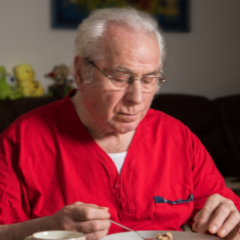What to Do When a Person Stops Eating and Drinking in Hospice
What to Do When a Person Stops Eating and Drinking in Hospice
A person in hospice may stop eating and drinking when they near the final stage of life. While it may be distressing when a loved one refuses food or drink, this is a natural part of the dying process. A loss of appetite is normal and expected.
In this stage, a person who takes in little or no food or fluid usually does not suffer from hunger or thirst. This decrease in intake means the body is conserving the energy that would normally be used to process food and fluid. It is not a medical emergency and does not require invasive interventions. So what should you do when a person stops eating or drinking in hospice?
Don’t Force Food or Drink
When we are feeling healthy, food is often a source of comfort. You may be tempted to encourage a loved one to eat as a way to make them feel better. But when someone is dying, forcing food or attempting to coax a loved one into eating or drinking may increase anxiety or cause discomfort. Instead of food, you can offer other sources of comfort, such as conversation, touch, gentle massage, music or simply sitting together.
Take cues from your loved one. If they are not interested in eating, let them make that choice. It is important to respect their wishes and allow them to ‘listen’ to their body. If you are concerned, a Gilchrist hospice nurse is always available to answer questions, 24 hours a day, seven days a week.
How to Reduce Discomfort

If your loved one can still eat, there are ways to reduce discomfort. It helps to give pain and nausea medication 30 minutes before meals, as prescribed by your Gilchrist clinician. In addition, you can provide smaller portions and let your loved one choose what to eat and when. Consider eating together, even if it is not in the kitchen or at a table.
You may notice your loved one has a dry mouth or chapped lips. You can give them small chips of ice, sorbet or frozen juice, which may feel refreshing in the mouth. Toothettes—moistened swabs attached to sticks that are sometimes referred to as “lollipops”—may help keep the mouth and lips moist and comfortable. A cool washcloth on the forehead may also be soothing.
Your hospice nurse will share with you other ways to provide comfort to your loved one. Our team of professionals will assist you in preparing for all the changes that occur in the final stages of life and provide emotional support throughout the end-of-life process.
Learn more about Gilchrist Hospice Care


